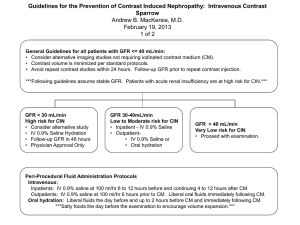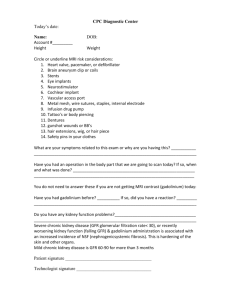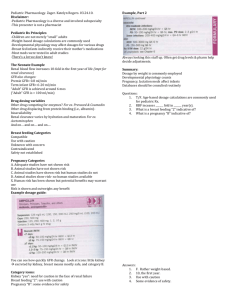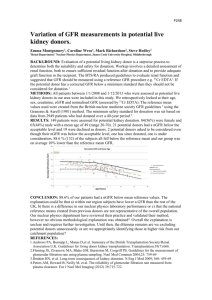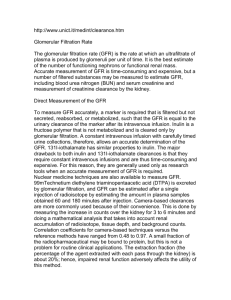Course Syllabus - Department of Psychology
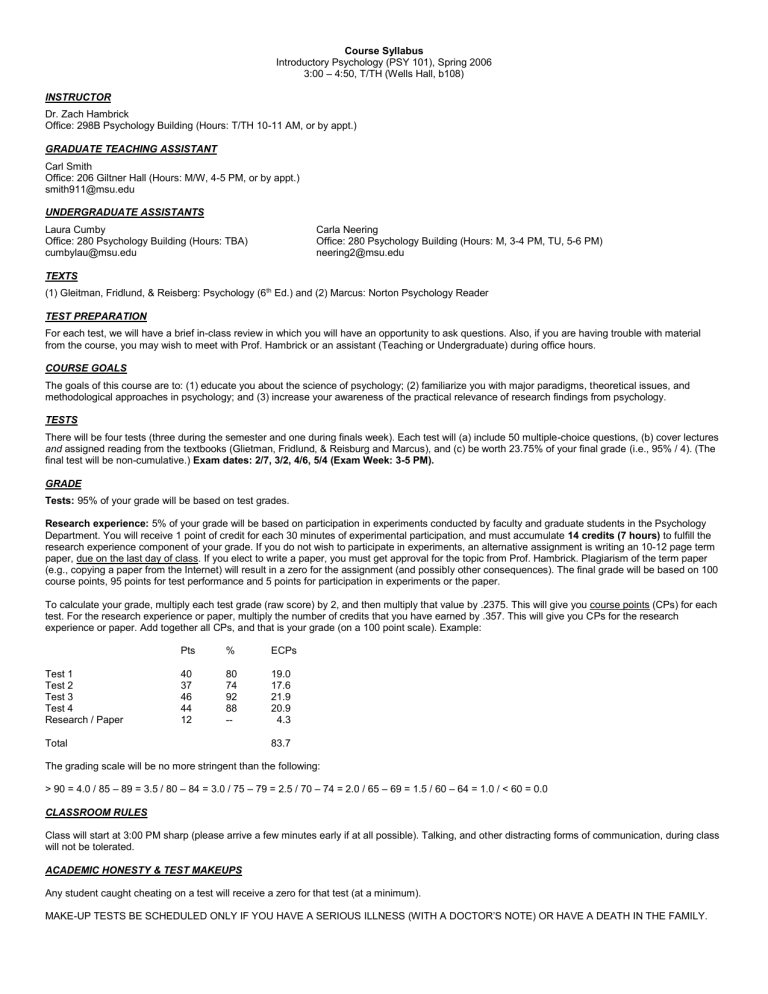
Course Syllabus
Introductory Psychology (PSY 101), Spring 2006
3:00 – 4:50, T/TH (Wells Hall, b108)
INSTRUCTOR
Dr. Zach Hambrick
Office: 298B Psychology Building (Hours: T/TH 10-11 AM, or by appt.)
GRADUATE TEACHING ASSISTANT
Carl Smith
Office: 206 Giltner Hall (Hours: M/W, 4-5 PM, or by appt.) smith911@msu.edu
UNDERGRADUATE ASSISTANTS
Laura Cumby
Office: 280 Psychology Building (Hours: TBA)
Carla Neering
Office: 280 Psychology Building (Hours: M, 3-4 PM, TU, 5-6 PM) cumbylau@msu.edu neering2@msu.edu
TEXTS
(1) Gleitman, Fridlund, & Reisberg: Psychology (6 th Ed.) and (2) Marcus: Norton Psychology Reader
TEST PREPARATION
For each test, we will have a brief in-class review in which you will have an opportunity to ask questions. Also, if you are having trouble with material from the course, you may wish to meet with Prof. Hambrick or an assistant (Teaching or Undergraduate) during office hours.
COURSE GOALS
The goals of this course are to: (1) educate you about the science of psychology; (2) familiarize you with major paradigms, theoretical issues, and methodological approaches in psychology; and (3) increase your awareness of the practical relevance of research findings from psychology.
TESTS
There will be four tests (three during the semester and one during finals week). Each test will (a) include 50 multiple-choice questions, (b) cover lectures and assigned reading from the textbooks (Glietman, Fridlund, & Reisburg and Marcus), and (c) be worth 23.75% of your final grade (i.e., 95% / 4). (The final test will be non-cumulative.) Exam dates: 2/7, 3/2, 4/6, 5/4 (Exam Week: 3-5 PM).
GRADE
Tests: 95% of your grade will be based on test grades.
Research experience: 5% of your grade will be based on participation in experiments conducted by faculty and graduate students in the Psychology
Department. You will receive 1 point of credit for each 30 minutes of experimental participation, and must accumulate 14 credits (7 hours) to fulfill the research experience component of your grade. If you do not wish to participate in experiments, an alternative assignment is writing an 10-12 page term paper, due on the last day of class. If you elect to write a paper, you must get approval for the topic from Prof. Hambrick. Plagiarism of the term paper
(e.g., copying a paper from the Internet) will result in a zero for the assignment (and possibly other consequences). The final grade will be based on 100 course points, 95 points for test performance and 5 points for participation in experiments or the paper.
To calculate your grade, multiply each test grade (raw score) by 2, and then multiply that value by .2375. This will give you course points (CPs) for each test. For the research experience or paper, multiply the number of credits that you have earned by .357. This will give you CPs for the research experience or paper. Add together all CPs, and that is your grade (on a 100 point scale). Example:
Pts % ECPs
Test 1
Test 2
Test 3
Test 4
40
37
46
44
12
80
74
92
88
--
19.0
17.6
21.9
20.9
4.3 Research / Paper
Total 83.7
The grading scale will be no more stringent than the following:
> 90 = 4.0 / 85
– 89 = 3.5 / 80 – 84 = 3.0 / 75 – 79 = 2.5 / 70 – 74 = 2.0 / 65 – 69 = 1.5 / 60 – 64 = 1.0 / < 60 = 0.0
CLASSROOM RULES
Class will start at 3:00 PM sharp (please arrive a few minutes early if at all possible). Talking, and other distracting forms of communication, during class will not be tolerated.
ACADEMIC HONESTY & TEST MAKEUPS
Any student caught cheating on a test will receive a zero for that test (at a minimum).
MAKE-UP TESTS BE SCHEDULED ONLY IF YOU HAVE A SERIOUS ILLNESS (WITH A DOCTO R’S NOTE) OR HAVE A DEATH IN THE FAMILY.
Introduction
1/10
1/12
Part I
Course Overview
Introduction to Psychology No reading
1/17
1/19
1/24
1/26
1/31
2/2
2/7
Research Methods-1
Research Methods-2
Biological Bases of Behavior-1
Biological Bases of Behavior-2
Learning-1
Learning-2
Part II
Test 1
2/9
2/14
2/16
2/21
2/23
2/28
3/2
Part III
3/14
3/16
Sensation-1
Sensation-2
Perception-1
Perception-2
Memory-1
Memory-2
Test 2
Thought & Knowledge-1
Thought & Knowledge-2
GFR Ch. 1 (pp. 4-13); M (pp. 3-11)
GFR Ch. 1 (pp. 13-32); M (pp. 27-37)
GFR Ch. 2 (pp. 42-56)
GFR Ch. 2 (pp. 56-62); M (pp. 58-69)
GFR Ch. 4 (pp. 124-132); M (pp. 117-128)
GFR Ch. 4 (pp. 132-142)
GFR Ch. 5 (pp. 168-183); M (pp. 91-95)
GFR Ch. 5 (pp. 183-199)
GFR Ch. 6 (pp. 204-228); M (pp. 81-90)
GFR Ch. 6 (pp. 229-232)
GFR Ch. 7 (pp. 242-256); M (pp. 165-176)
GFR Ch. 7 (pp. 256-273)
GFR Ch. 8 (pp. 278-298)
GFR Ch. 9 (pp. 320-338); M (pp. 97-107)
3/21
3/23
3/28
3/30
Social Psychology-1
Social Psychology-2
Cognitive Development-1
Cognitive Development-2
Social Development 4/4
4/6
Part IV
Test 3
4/11
4/13
4/18
4/20
4/25
Intelligence-1
Intelligence-2
Personality
TBA
Psychopathology
Treatment of Psychopathology 4/27
5/4
GFR Ch. 10 (pp. 370-387)
GFR Ch. 10 (pp. 387-407); M (pp. 265-272)
GFR Ch. 12 (pp. 466-499); M (pp. 146-153)
GFR Ch. 12 (pp. 499-501)
GFR Ch. 13 (pp. 506-522)
GFR Ch. 14 (pp. 552-570)
GFR Ch. 14 (pp. 570-585); M (pp. 199-208)
GFR Ch. 15 (pp. 590-607); M (pp. 291-303)
No reading
GFR Ch. 16 (pp. 642-681); M (pp. 349-357)
GFR Ch. 17 (pp. 686-715); M (pp. 366-379)
Test 4 (Exam Week: 3-5 PM, Wells, b108)
GFR = Gleitman, Fridlund, & Reisberg; M = Marcus.
